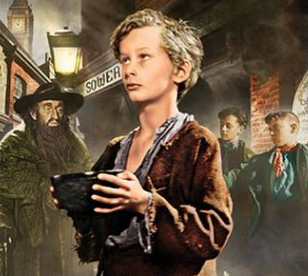
Twisting Dickens:
Analyzing David Lean's Adaptation of Oliver Twist
Home
Critical Essay
Part I
Part II
Part III
Bibliography
Related Web Links
Last Updated: 12/12/2008
Part I: Characterization
Lean directs his adaptation of Oliver Twist in such a way he is able to reinterpret and embellish on the themes which Dickens presents. Lean focuses on themes which are directed toward the viewers of the 1940’s, placing great importance on the character of Oliver and his interactions with the characters Fagin and Mr. Brownlow.
Throughout Dickens's novel, Oliver is on the path to find his true identity. Dickens chooses to use the identities of the novel’s other characters to build the identity of Oliver. Oliver is never alone, but always guided by the wants of others. While moments, such as Oliver’s escape from Mr. Sowerberry as well as his escape from the criminal gang, are pivotal in the novel, they are treated more as turning points necessary to connect the story lines of the other characters of the novel. Oliver’s character has very little say as to his state of affairs and seems to be in a constant state of flux between the innocence he should possess as a child and the experience he has been forced to witness by the cruel hand of society.
David Lean’s film adaptation, however, chooses to primarily focus on the character of Oliver and his journey. Lean’s portrayal of Oliver’s interactions with the other characters allow for the viewer to see Oliver as a boy who has maintained his innocence, in spite of his surroundings. Lean characterizes Oliver with an aura of hope and endurance. The Oliver of Lean’s adaptation, is not helplessly caught between what he should possess and his actual life experiences.
Within the characters of Fagin the Jew and Mr. Brownlow, the reader is able to see the constant struggle of nature versus nurture and Oliver’s inner struggle between his innocence and his experience. Both Dickens and Lean choose to characterize Mr. Brownlow as the representative nurturer and Fagin as the representation of (human) nature or survival. Fagin exemplifies the experiential wisdom one must possess to survive the harsh conditions of London’s streets and social system. He seeks to corrupt and use Oliver’s innate innocence and hopefulness. While Dickens characterizes Fagin as a devilish, yet paternal figure, Lean portrays Fagin as an alert and deadly criminal mind. Mr. Brownlow exemplifies the genuine care and consideration which was lacking on the streets of London. Dickens characterizes Mr. Brownlow as the mark of intelligence who has come down to sweep Oliver to the identity he was meant to have. Lean portrays Mr. Brownlow as genuine, kind man who has been searching for Oliver and wants to bring him back to his true family.